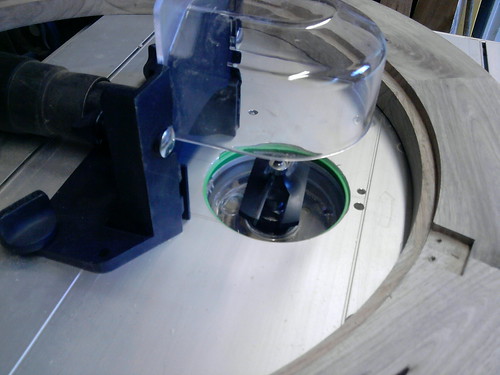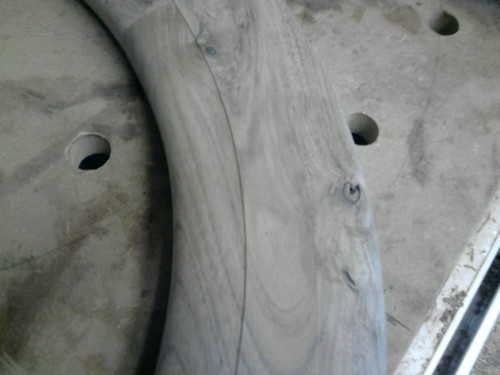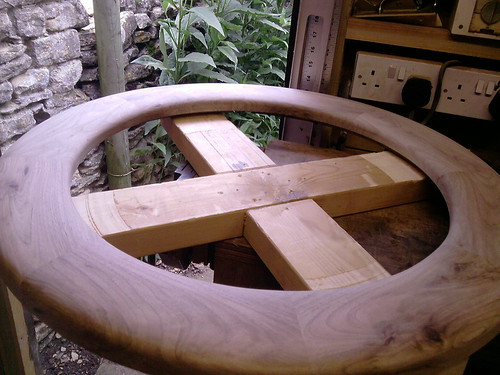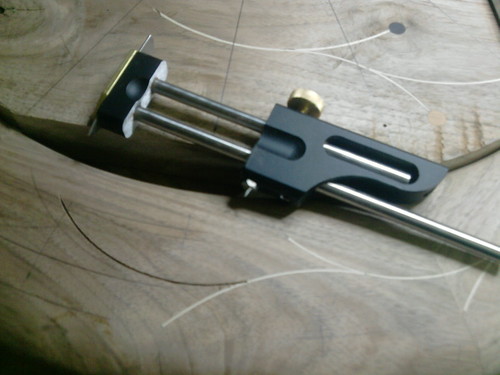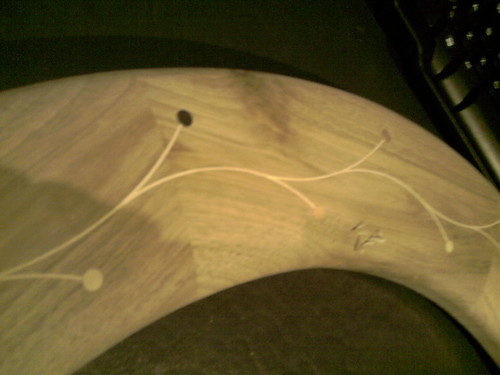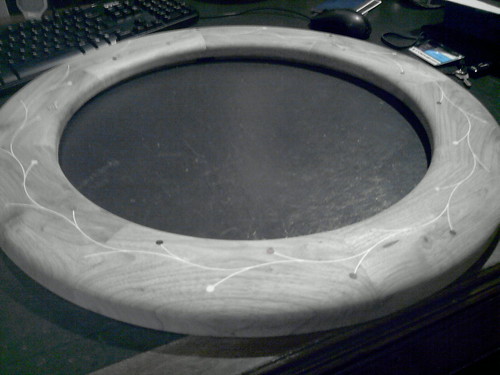gasman
Established Member
Tasked to come up with a mirror for a house by the sea - I thought a nautical theme in the form of a 'porthole' would do
I have some walnut which has been planked and drying for a couple of years and thought that would come up nicely...
So first here is the wood together with an 18" circular mirror
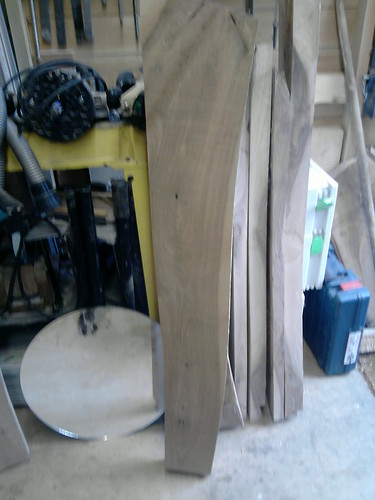
The wood was planed and thicknessed to 32mm, then cut into 8 wedges 10" long and at least 4" wide roughly with a 22.5 degree angle at each end. These were joined together in pairs with a single 10mm domino cut centrally in the ends. Each pair was then joined together to form 'half' a circle.
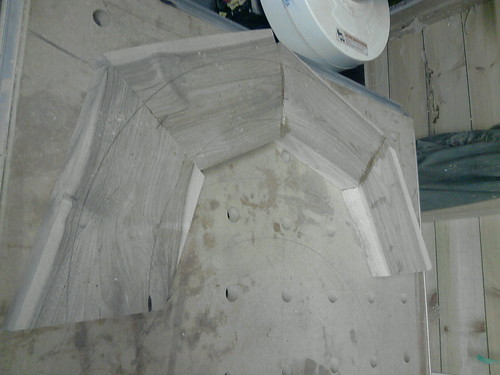
I cut down the edges of the two half circles with a guide-rail-guided saw. The two halves were the dominoed together to form a circle.
Then I made two 24" lengths of 4x2s into a cross with a central 32 mm piece of wood screwed to the centre and an 8mm hole drilled in the middle. I screwed the rough circle to this through the back of the circle so that the hole was roughly at the centre of the circle. I then used a long straight router cutter in the Trend T11 mounted in the MFS400 festool jig. The pivot of the MFS400 sits in the 8mm hole so that you can swing the whole jig around the pivot point and gradually cut the waste wood away. I carried on doing this until I had just got rid of all the sapwood. In this way the inner and outer circular curves of the mirror were cut leaving me with a circular frame about 3 inches wide.
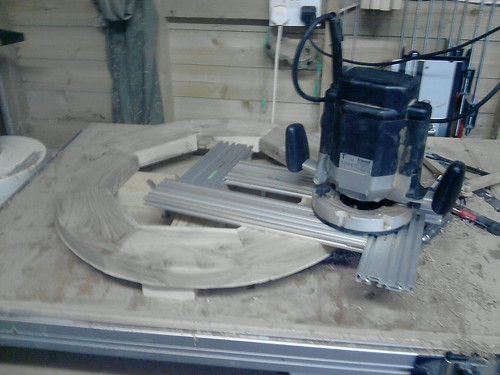
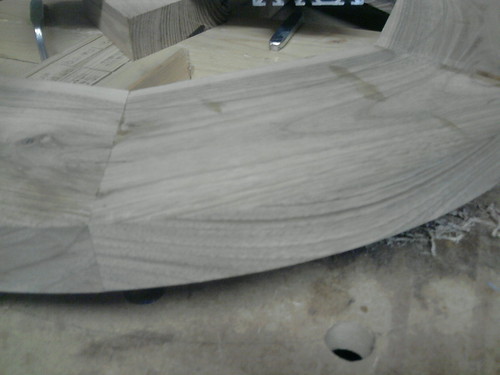
ONce this was done I had my basic circular form
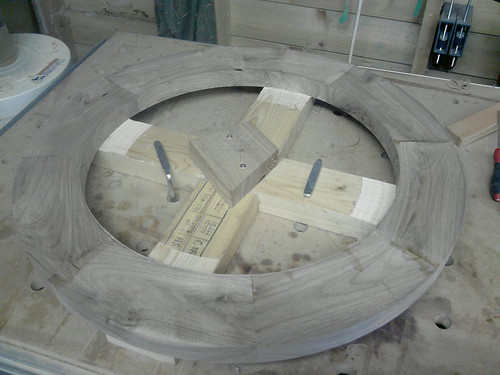
Sanded it to get rid of the glue marks
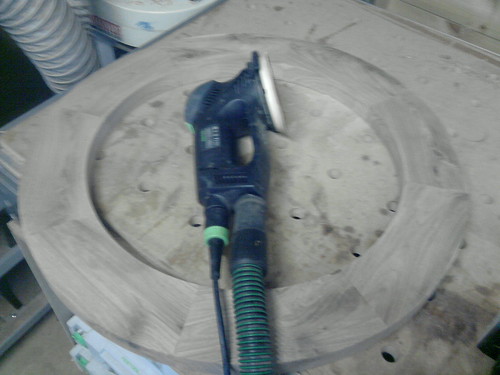
and then put the mirror in to see what it would look like
Then got a bit stuck as I wanted to have a convex front to the mirror. The only way I can think of to do this is either on a lathe and I think it would be very difficult to mount it exactly on the plate with the centre of the circle exactly in the centre - or to use some sort of bearing guided router bit but as the frame is 3" wide, it would have to be a heck of a large thumb moulding bit. Any better ideas?
Thanks for looking and the advice!
I have some walnut which has been planked and drying for a couple of years and thought that would come up nicely...
So first here is the wood together with an 18" circular mirror

The wood was planed and thicknessed to 32mm, then cut into 8 wedges 10" long and at least 4" wide roughly with a 22.5 degree angle at each end. These were joined together in pairs with a single 10mm domino cut centrally in the ends. Each pair was then joined together to form 'half' a circle.

I cut down the edges of the two half circles with a guide-rail-guided saw. The two halves were the dominoed together to form a circle.
Then I made two 24" lengths of 4x2s into a cross with a central 32 mm piece of wood screwed to the centre and an 8mm hole drilled in the middle. I screwed the rough circle to this through the back of the circle so that the hole was roughly at the centre of the circle. I then used a long straight router cutter in the Trend T11 mounted in the MFS400 festool jig. The pivot of the MFS400 sits in the 8mm hole so that you can swing the whole jig around the pivot point and gradually cut the waste wood away. I carried on doing this until I had just got rid of all the sapwood. In this way the inner and outer circular curves of the mirror were cut leaving me with a circular frame about 3 inches wide.


ONce this was done I had my basic circular form

Sanded it to get rid of the glue marks

and then put the mirror in to see what it would look like
Then got a bit stuck as I wanted to have a convex front to the mirror. The only way I can think of to do this is either on a lathe and I think it would be very difficult to mount it exactly on the plate with the centre of the circle exactly in the centre - or to use some sort of bearing guided router bit but as the frame is 3" wide, it would have to be a heck of a large thumb moulding bit. Any better ideas?
Thanks for looking and the advice!


































